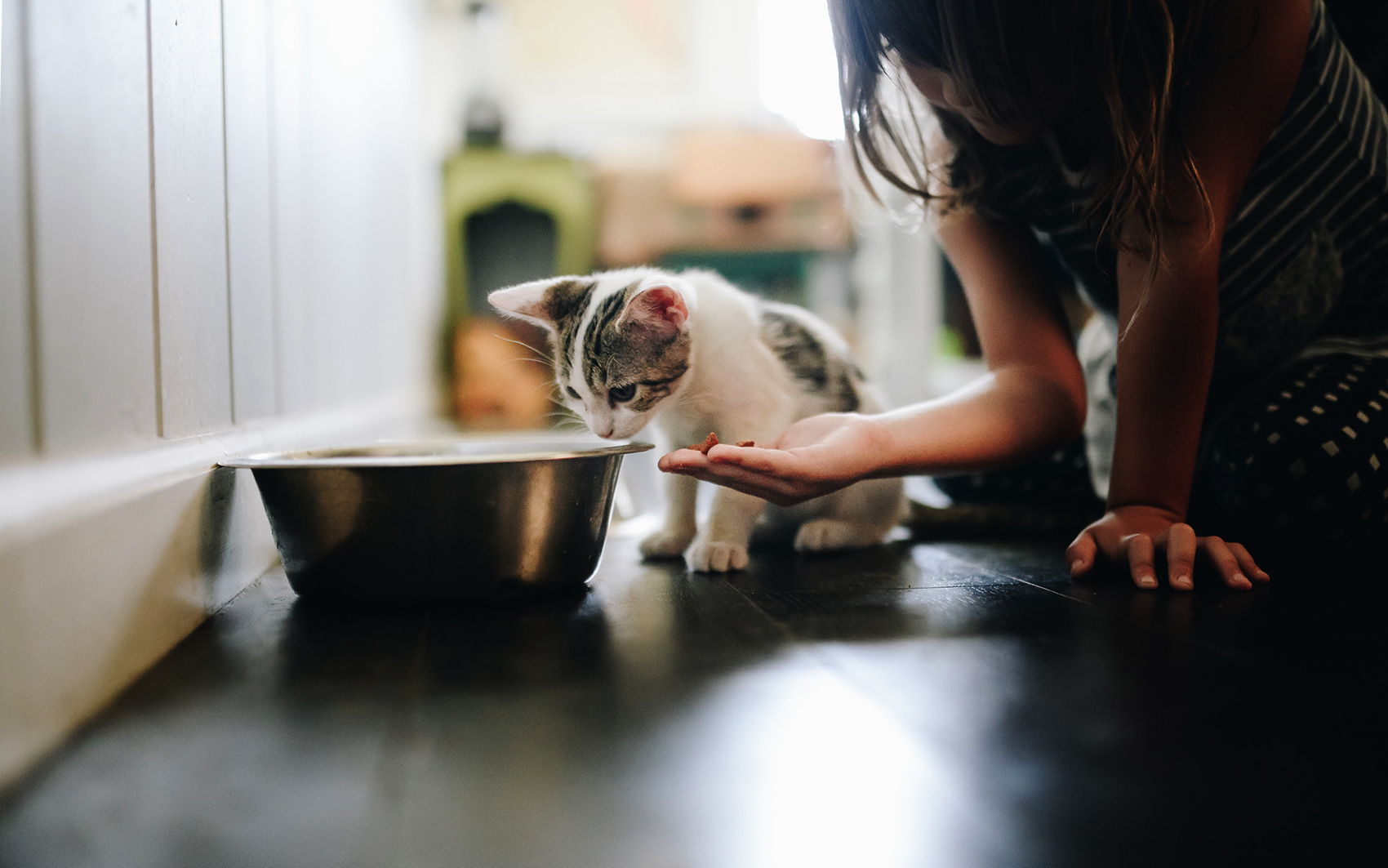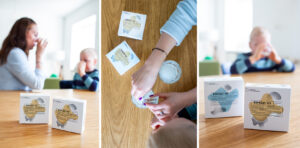
Ja sam! O samodzielności przedszkolaka
Spis treści:
Jak wspierać samodzielność dziecka na różnych etapach rozwoju
Kto u was w domu wyjmuje naczynia ze zmywarki? Zdejmuje pranie z suszarki? Napełnia kocią miskę karmą? Wszystkie te zadania może spokojnie wykonać przedszkolak. Wystarczy, że pokażecie mu, jak to zrobić.
Małe dzieci mają ogromną potrzebę wykazania się samodzielnością, co wyrażają często frazą „ja sam!”. Dlatego uparcie walczą z nieskorymi do współpracy skarpetkami albo spędzają kwadrans, próbując nabić na widelec uciekający po całym talerzu zielony groszek. A potem przychodzi dorosły i załatwia sprawę jednym ruchem. Bo tak będzie szybciej, bo nie rozleje, nie pobrudzi i nie zepsuje. “To błąd! – mówi psycholożka i terapeutka Karina Milan-Szymańska. “Rodzic powinien pozostać czujny i otwarty na zmieniającą się gotowość do eksplorowania świata swojego dziecka, uwzględniając kilka istotnych kwestii” – tłumaczy.
“Nauka samodzielności powinna być przede wszystkim dla dziecka bezpieczna, powinniśmy być przygotowani na możliwe konsekwencje takiej nauki np. rozlaną zupę czy zabrudzone ubranko, zadbać o odpowiedni czas i komfort, w tym własny stan emocjonalny – w pośpiechu często nie pozostawiamy dzieciom przestrzeni na trening samodzielności lub reagujemy nerwowo, co może zniechęcić dziecko w przyszłości” – wyjaśnia.
Dla malucha każde wykonane zadanie jest małym zwycięstwem i powodem do dumy, nie zaś obciążającym i przykrym obowiązkiem. Tajemnica sukcesu tkwi w dostosowanych do wieku zadaniach.
Dwulatka wcale nie trzeba karmić, trzeba natomiast zachować zimną krew, gdy jedzenie będzie wszędzie, bo jednak droga z talerza do buzi bywa kręta i pełna niespodzianek. Przedszkolak nie tylko da radę posprzątać klocki, ale też pościelić własne łóżko i rozłożyć sztućce do rodzinnego obiadu. Pierwszoklasista zupełnie samodzielnie przygotuje śniadanie, jeśli tylko będzie miał okazję spróbować. Im dziecko starsze, tym więcej potrafi i więcej może. A im więcej może, tym czuje się mocniejsze i bardziej niezależne.
Zdaniem psycholożki wspierać samodzielność dziecka możemy na kilka sposobów:
- stwarzając okazje do wykonywania nowych czynności samodzielnie, bez pośpiechu:
“Świetnie sprawdzają się domowe obowiązki pod warunkiem, że są dostosowane do wieku dziecka”
- zapraszając dziecko do towarzyszenia nam w różnych aktywnościach, ale nie zmuszając go:
“Wewnętrzna motywacja sprzyja nauce, zaś przymus buduje niechęć i opór. W ten właśnie sposób, poprzez obserwację i modelowanie, najszybciej przyswajamy nową porcję wiedzy i umiejętności”.
- nie wyręczając dziecka, a zachęcając do samodzielnych prób rozwiązywania problemów:
“Dajmy mu na to czas. Zaczekajmy, aż samo poprosi o pomoc. Bądźmy blisko, by normalizować porażki i doceniać starania dziecka, a nie efekty”
- pozwalając dziecku podejmować samodzielne decyzje:
“To pozwoli mu rozwinąć świadomość własnych potrzeb, da poczucie sprawstwa i nauczy ponoszenia konsekwencji swoich decyzji”
- pozwalając dziecku doświadczyć porażki:
“Nie jesteśmy w stanie uchronić dziecka przed pomyłkami i błędami, natomiast możemy mu pomóc lepiej sobie z nimi radzić i nie bać się eksperymentów”
- pozostając otwartym na propozycje dziecka i wspierając wszelkie naturalne przejawy samodzielności:
Korzyści z samodzielności dla rozwoju dziecka
Psycholożka Karina Milan-Szymańska podkreśla, że samodzielność rozwija tak cenioną przez rodziców pewność siebie u dziecka, świadomość swoich mocnych stron i umiejętności.
“W praktyce takie dzieci są bardziej otwarte na nowe doświadczenia, chętniej angażują się w różne aktywności, co przekłada się na pozyskiwanie kolejnych, cennych kompetencji. Lepiej radzą sobie ze stresem i porażkami, które nie wywołują rezygnacji czy wycofania” – wyjaśnia.
Ponadto, zdaniem specjalistki dzieci, które miały okazję do nauki samodzielności, są bardziej sprawcze i zaradne życiowo. “To właśnie te cechy, jak pokazują najnowsze badania, są najlepszym predykatorem życiowego sukcesu” – dodaje.
Znaczenie cierpliwości i zachęty w budowaniu samodzielności dziecka
Podczas nauki samodzielności rodzic powinien przede wszystkim pozwalać na próby i nie tracić cierpliwości, gdy ciągle coś nie wychodzi. Pomagać, czyli pokazać, w jaki sposób poradzić sobie z nowym wyzwaniem i zadbać o bezpieczeństwo, ale nie wykonywać zadań za dziecko.
“Starajmy się unikać przesadnej opiekuńczości, gdy – chcąc zaoszczędzić dziecku rozczarowań – nadmiernie je wyręczamy” – tłumaczy psycholożka.
Pomocne może okazać się wprowadzenie drobnych ułatwień. Niewielki taboret pozwoli dosięgnąć do kuchennego blatu, dzięki „bezpiecznemu” nożowi pokrojenie pomidora nie zmieni się w krwawą jatkę, a niżej umieszczony wieszak załatwi sprawę rzucanych na podłogę kurtek.
Przyda się też wiara w każdy kolejny krok do niezależności dziecka, ale nie przesadny zachwyt, o czym przypomina psycholożka. „Nie warto przesadzać z zachwytem, zdecydowanie lepiej sprawdzi się informacja o tym, że po prostu widzimy, co nasze dziecko robi” – mówi Karina Milan-Szymańska.
Zdaniem psycholożki w budowaniu samodzielności dziecka kluczowe wydaje się zadbanie o własny stan emocjonalny oraz dostosowanie oczekiwań do realiów.
“Jeśli będziemy spokojni, zrelaksowani, wyspani, będzie nam łatwiej zachować cierpliwość i dać dziecku czas czy pozwolić na błędy. Pamiętajmy, że nowe umiejętności wymagają treningu, podczas którego pojawią się niepowodzenia. Jest to zupełnie naturalne. Oczekiwanie szybkich sukcesów jest z założenia błędne” – wyjaśnia Karina Milan-Szymańska.
Specjalistka podkreśla, że pozytywna motywacja zachęca do eksperymentowania, pozostawia przestrzeń na błędy, które traktuje jako naturalny element procesu nauki. “To powoduje, że dziecko może podejmować kolejne próby bez obawy przed krytyką czy karą. Uczy się w ten sposób, że błędy są czymś zwyczajnym, normalnym, pozwalającym wyciągnąć wnioski i nie określają go, jako osoby. Nie musi z ich powodu doświadczać wstydu, który mógłby ograniczyć czy zahamować chęć dalszego poznawania świata” – mówi.
Przykłady aktywności i zabaw promujących samodzielność przedszkolaka
Dzieci na początku wieku przedszkolnego mają silną potrzebę samodzielności, chcą się uczyć nowych rzeczy i podejmują ten trud. I to jest super okazja, by chęć samodzielności przekuć w trening podstawowych czynności samoobsługowych tj. jedzenie, mycie rąk, sprzątanie zabawek, wchodzenie i schodzenie po schodach, komunikowanie i załatwianie potrzeb fizjologicznych. Jak dobrze wiemy, nauka przez zabawę to najlepszy sposób na uczenie się nowych umiejętności.
“Zabawa jest fantastyczną okazją do przećwiczenia wielu praktycznych i cennych umiejętności w atmosferze akceptacji i bliskości. W takich okolicznościach możemy zamodelować pewne reakcje, zachęcić dziecko do wchodzenia w nowe role czy próbowania nowych umiejętności” – mówi psycholożka Karina Milan-Szymańska.
Dziecko, które usłyszy “bawimy się w segregację zabawek”, a nie “posprzątaj zabawki w swoim pokoju”, chętniej zabierze się do pracy. Poprzez zabawę możemy trenować zakładanie butów, by następnie opanować sztukę dopasowania buta do odpowiedniej nogi. Zostały wam buciki z okresu, kiedy wasz przedszkolak był niemowlakiem? Jeśli tak, to dajcie mu przetrenować zakładanie niechodków lalkom albo misiom, a następnie powiedzcie: “miś jest gotowy na spacer, teraz kolej na ciebie”. Pamiętajmy, by zamiast ciasnych, sztywnych półbutów ze zwijającym się językiem, sznurówkami i klamerkami, dać dziecku buty zapinane na rzepy, najlepiej tenisówki i trampki, które nie wywołają na starcie frustracji.
Samodzielnie przygotowany posiłek cieszy bardziej niż ten podany przez rodzica. Zaproś przedszkolaka do pomocy w przyrządzaniu kolacji. Daj mu drewniany nóż z dziecięcego zestawu i poproś o posmarowanie kromki masłem, następnie o ułożenie na kanapce wędliny i pokrojenie plasterków ogórka. Kanapka, która wyjdzie spod dziecięcej ręki może nie będzie perfekcyjnie wyglądała – masło być może będzie z każdej strony, z ogórka będzie zbudowana wieża, a wędlina w najlepszym wypadku będzie zsuwała się z kromki, ale na pewno będzie to pyszne kulinarne dzieło, które dziecko zje z uśmiechem na buzi. A historią jej powstania podzieli się z każdym członkiem rodziny – to jest więcej niż pewne!
“Zabawa jest najprzyjemniejszą formą nauki dla przedszkolaka, a dla rodzica okazją do pogłębienia relacji z dzieckiem” – przypomina psycholożka.







































